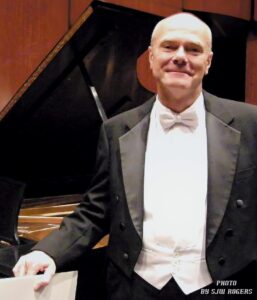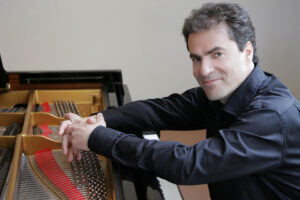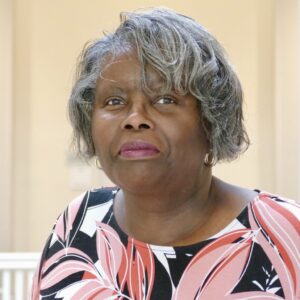Distinguished Retirees
Tonu Kalam
 For 36 years Professor Tonu Kalam molded the UNC Symphony Orchestra into one of the finest undergraduate collegiate orchestras in the United States. His formidable musicianship, influenced by his father and his training at some of the most prestigious music festivals, including Tanglewood, Aspen, and Marlboro, produced award-winning performances. These include the 2012 The American Prize in Orchestral Performance — College/University Division, for the video of the UNCSO’s live performance of Rachmaninoff’s Symphonic Dances.
For 36 years Professor Tonu Kalam molded the UNC Symphony Orchestra into one of the finest undergraduate collegiate orchestras in the United States. His formidable musicianship, influenced by his father and his training at some of the most prestigious music festivals, including Tanglewood, Aspen, and Marlboro, produced award-winning performances. These include the 2012 The American Prize in Orchestral Performance — College/University Division, for the video of the UNCSO’s live performance of Rachmaninoff’s Symphonic Dances.
Tonu was one of the first faculty members I met at UNC when arrived in 2008, his radio-perfect voice exuding a clarity and focus that could be heard carrying out of the rehearsal hall on Monday and Wednesday evenings as he calmly, insistently, and artistically brought out polished and exciting performances of major symphonic works. His concerto concerts, in which the energy on the stage was matched by the excitement coming from the huge crowd of friends, family, and community members, was always a highlight of the year. The UNCSO appeared often in the Carolina Performing Arts series. CPA knew that Tonu’s orchestra would pair perfectly with world class artists such as violinist Gil Shaham and mezzo-soprano Isabel Leonard.
Tonu is a voracious student of the scores he conducts and of the chamber music he expertly coached, pouring over editions, reconciling errors, and getting to the core of the composer’s intentions without distraction. I would sneak into his rehearsals and marvel how efficiently and effortlessly he worked with the orchestra. I saw musical intensity that found time to deliver details; erudition without pedantry; and relentlessly high standards balanced with a humanity that recognized how some students saw 7-9:30 pm as a respite from their other classes, while others as a lab for their pre-professional aspirations. Indeed, many of the students he collaborated with went on to successful careers in performance and orchestral management.
Tonu’s musical life now enters a new phase, filled with guest conducting, wonderful piano playing, travels around the world, and, I hope, a new podcast in which we can still hear his eloquent voice and be nourished by his musical knowledge.
by Professor Evan Feldman
Stefan Litwin
 Stefan Litwin (George C. Kennedy Distinguished Professor) joined the UNC Department of Music faculty in 2008 with a hammer in hand. Leaning beneath the upraised lid of a concert grand and giving an assertive whack to the piano’s stress bar he announced his presence in a performance of his solo piano composition “Lyon 1943, Pièce de Résistence”. That bold stroke was a signal of the precision, insight, and acuity of purpose that characterized Stefan’s years at UNC. Stefan brought wide-ranging skills as a pianist, chamber musician, conductor, composer, scholar, concert organizer, and omnivorous intellectual.
Stefan Litwin (George C. Kennedy Distinguished Professor) joined the UNC Department of Music faculty in 2008 with a hammer in hand. Leaning beneath the upraised lid of a concert grand and giving an assertive whack to the piano’s stress bar he announced his presence in a performance of his solo piano composition “Lyon 1943, Pièce de Résistence”. That bold stroke was a signal of the precision, insight, and acuity of purpose that characterized Stefan’s years at UNC. Stefan brought wide-ranging skills as a pianist, chamber musician, conductor, composer, scholar, concert organizer, and omnivorous intellectual.
A few years before his appointment, Stefan had appeared in a remarkable interview-lecture-recital in Person Hall with Nuria Schoenberg Nono (Arnold Schoenberg’s daughter and wife of the Italian modernist composer Luigi Nono). Stefan, playing musical examples at the keyboard, capped off the program with a memorable performance of Eduard Steuermann’s solo transcription of Schoenberg’s Kammersymphonie. The lecture-recital is one of Stefan’s great skills. He excels in the explication of music’s subtleties through the insights he offers verbally and instrumentally. In the classroom–for example with his trademark course, Sounds of War and Revolution–and from the concert stage Stefan helps the student and concert goer to hear what he hears, coaxing out an experience of music as the vital expression of its time and its composer. Indeed, the concert series he initiated at UNC, Talking Music, prioritized the interaction of artists with audience. With his integral connection to Germany and European musical life broadly, Stefan’s introduced a host of European artists to Chapel Hill for this series: the Arditti String Quartet, Ensemble Ascolta, the composer Alexander Goehr, the bass clarinetist/improviser Michael Riessler, the actor Hanns Zischler, and the tenor Christoph Prégardien, to name a few.
By inclination and commitment, Stefan’s music-making has centered on modern and new music. He is an expert on Schoenberg, grasps the vision of Cage, champions Eisler, and has a soft spot for Ives and Rzewski. He understands the language of his new music peers and promotes the living art through performance and composition, all of which he shared with UNC audiences. At the same time, he is as deeply invested in earlier repertoire, Beethoven particularly. Tellingly, his commercial recordings, of which there are now over 20, regularly offer fresh perspective by placing the newer (frequently including a piece of his own) alongside the older. His recent release, Programs VII (Telos Music Recordings, 2022) deftly juxtaposes Schumann’s Fantasiestücke, op. 12 and Kinderszenen, op. 15 with Stefan’s own highly inventive spinoff/commentary, Kinderszenen für 8 Spieler und Sampler. With this work and others written in the last few years, Stefan’s compositional output has soared. There are three recent music theatre works (with more to come), a profound new string quartet, and a magical mediation for piano on the Andean folk melody “Huakajchi”. Let’s hope that we may soon be able to hear this music in Chapel Hill.
While retired from UNC, Stefan continues in his post as Professor for Contemporary Music, Piano, Chamber Music and Interpretation at Hochschule für Music Saar (Germany), a position he held while teaching a UNC. Stefan maintains his home in Berlin, the hub of his ever active and far-reaching musical life.
by Professor Emeritus Allen Anderson
Angeline Warren

Angeline Warren retired on June 30, 2024 after 20 years in the department. We are so grateful to Ms. Warren for her many years of service to the department and university!
Ms. Warren began as a temporary employee at the university and has been a permanent employee since July 1991. She moved to the music department in June 2004. In her time in music, Ms. Warren has been a pillar of the department, helping generations of music students register for classes, navigate lessons (and fees), and brightening all our days with her smile and warm welcome.
In an interview from 2020, when asked what drew her to the department, Ms. Warren told us, “I really enjoy working with the students and getting to know them. It’s always a joy when they come back to visit after graduation and update me on their life!”
“The music department is a great place to work with such great faculty and staff. It is a joy to come to work.”
Ms. Warren also let us know that outside of work, she loves to read, go on walks with friends, travel, volunteer at her church, bowl, and play a few computer games. She also enjoys attending Playmakers and Carolina Performing Arts performances. We hope she’ll have more time for all these things in retirement!
We will miss her, but also wish her all the very best as she heads into her next adventures in retirement. Thank you, Ms. Warren!
by Catherine Zachary, ’10
